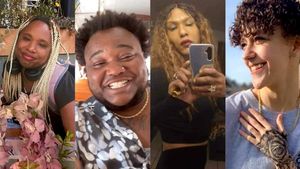All Rights reserved
By continuing to use our site, you agree to our Private Policy and Terms of Use.
Does it ever feel like the fate of our democracy is hanging by a tiny, fragile thread? It is, and her name is Ruth Bader Ginsburg.
The 86-year-old Supreme Court judge stands in the way of a comfortable conservative majority on the bench. With President Trump having the opportunity to fill two vacant seats on the court with judges Neil Gorsuch and Brett Kavanaugh, the bench now tilts 5-4 to the right. A 6-3 plurality would give Republicans the opportunity to reshape American jurisprudence for decades.
Trump is reportedly ready to fill Ginsburg's seat should she retire, with a list of judges who have been pre-vetted by conservative, anti-LGBTQ+ think tanks like the Heritage Foundation and the Federalist Society.
But unfortunately for the president, Ginsburg has no plans to die anytime soon.
After successfully completing treatment for pancreatic cancer, the progressive jurist visited the University at Buffalo School of Law this Monday. She appeared in a jovial mood, cracking jokes about her near-historic longevity: Ginsburg is the fourth oldest judge to ever be seated on the court, behind Oliver Wendell Holmes, John Paul Stevens, and Roger B. Taney.
"I am now 86 years old, yet people of all ages want to take their picture with me -- amazing," she told the crowd while accepting an honorary degree from the college.
While news that the liberal icon would be undergoing three weeks of radiation treatments triggered widespread panic, this isn't the first time she's fought a cancer diagnosis. She's battled the ailment at least three times: colorectal cancer in 1999, pancreatic cancer in 2009, and lung cancer in 2018.
Not only does Ginsburg continue to bounce back, the justice stays in better shape than many people half her age. She works out with a personal trainer twice a week for an exercise routine that includes chest, back, abs, and glutes.
LGBTQ+ people are counting on Ginsburg to keep pumping those irons. On October 8, the court will weigh in on a trio of cases related to LGBTQ+ nondiscrimination protections, the outcome of which will decide if queer and transgender workers are entitled to protection under Title VII of the Civil Rights Act of 1964, which classifies characteristics like race, sex, national origin, and religion as protected classes.
In recent weeks, the Trump administration has filed a series of briefs arguing that federal civil rights laws do not prevent LGBTQ+ employees from being fired because of who they are or who they love.
If the outcome of those cases is a likely to be decided by a single vote, a court without Ginsburg on it could further embolden conservative justices to revisit pivotal LGBTQ+ rights decisions like Obergefell v. Hodges and Lawrence v. Texas, which legalized homosexuality and decriminalized sodomy, respectively.
RELATED | Ruth Bader Ginsburg Hospitalized After a Fall at Her Office


















































































Sexy MAGA: Viral post saying Republicans 'have two daddies now' gets a rise from the right